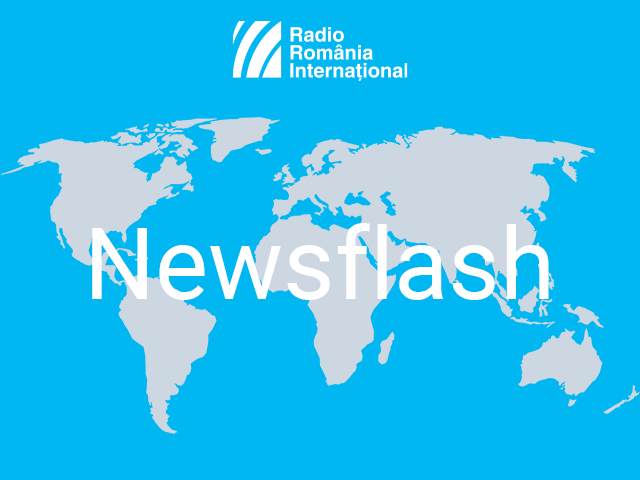November 16, 2021 UPDATE
Click here for a roundup of local and world news

Newsroom, 16.11.2021, 20:00
COVID-19 The coronavirus epidemic stays on a downward trend in Romania. On Tuesday the
authorities reported 4,128 new Covid infections out of over 55,000 tests, which
accounts for a 7.41% positive rate. Another 397 related fatalities were also
reported, including 54 that had not been recorded in the system earlier. Some
14,000 Covid patients are currently receiving hospital treatment, including
almost 1,700 in intensive care. The incidence rate is on the decrease in
Bucharest, dropping to 5.34 cases per 1,000 inhabitants on Tuesday. In related
news, non-invasive testing is due to begin in schools for children and
teachers. At the moment, almost three quarters of Romanian schools and kindergartens
are holding in-person classes, the rule being that only schools with a
vaccination rate among their staff of at least 60% can reopen for in-person
teaching, the rest holding classes on line. As for vaccination, the pace has
dropped steadily in recent days, compared to a peak of over 110,000 doses
administered on 27 September. Nearly 7 million Romanians are fully vaccinated
at present.
SCHOOLS Legal and financial education have become
compulsory skills in primary and middle schools in Romania. President Klaus
Iohannis Tuesday signed a law amending the Education Act, to include these
areas in the national curriculum. The document also includes financial and
legal education in the teaching programmes of local lifelong learning community
centres. In a first stage, these subjects can be introduced as optional school
subjects only, because national curricula must be approved by the Education
Ministry.
ECONOMY Romania,
Hungary and Lithuania have the biggest annual growth rate in the European Union
in the third quarter of this year compared with the same period last year,
according to preliminary data published by the European statistical office
Eurostat. GDP grew in the EU by 3.9%, with Romania at 8%, Hungary at 6.1% and
Lithuania at 6%. However, according to the latest figures published by the
National Institute for Statistics, Romania’s economic growth rate slowed down
to 0.3% in the third quarter compared with the previous quarter. In the first
nine months of the year, GDP grew by 7.1% compared with the same period last
year. Economic experts say the growth rate will slow down even more this autumn
and winter, while the inflation rate may go up to 8% in the context of the
current political crisis.
EU Romania’s
foreign minister Bogdan Aurescu attended a ministerial meeting of the Eastern
Partnership held in Brussels, where EU foreign ministers agreed to expand the
criteria for imposing new sanctions against Belarus. The new sanctions would
target those involved in weaponising the plight of migrants. The European Union
is accusing Belarus of intentionally creating a migrant crisis on the border
with Poland and the Baltic countries in retaliation to the Union’s earlier
sanctions against the regime in Belarus for its crackdown on the opposition.
Minister Aurescu presented Romania’s stand on the strategic priorities of the
Eastern Partnership post-2020 and called for a consolidation of the security
dimension in the Eastern Neighbourhood, as well as for greater involvement from
the EU in solving the frozen or protracted conflicts in this region.
MILITARY The EU is considering a joint military force of up to 5,000 troops by
2025, to intervene in a number of crises without needing to rely on the US,
according to a draft strategic plan, Reuters says. The EU
Rapid Deployment Capacity should include land, sea and air capabilities. Two decades after the EU leaders first agreed to
set up a force of 50,000-60,000 troops, which never became operational, the
strategy drafted by the EU diplomacy chief Josep Borrell is the most concrete
effort to create an independent military force that does not rely on US assets.
Not all the 27 EU member states would have to contribute troops, but a
consensus would be required for any deployment. Since 2007, the EU has had
battlegroups of 1,500 troops available, but they have never been deployed, in
spite of efforts to use them in Chad and Libya.
Radio and TV Parliament
approved the new leadership of the Romanian Radio Broadcasting Corporation,
which Radio Romania International also forms part of. With the support of the
Social Democratic Party, the new director general at Radio Romania isRăzvan-Ioan
Dincă, a former National Opera director who has a court of first instance
conviction for abuse of office and false statement but who was later acquitted.
The leadership of the Romanian television was also appointed, with the
journalist Dan Cristian Turturică becoming the new director general, with the
support of the National Liberal Party. The members of the new boards are
appointed for a 4-year term and have to take an oath in Parliament. (tr. A.M. Popescu)





























